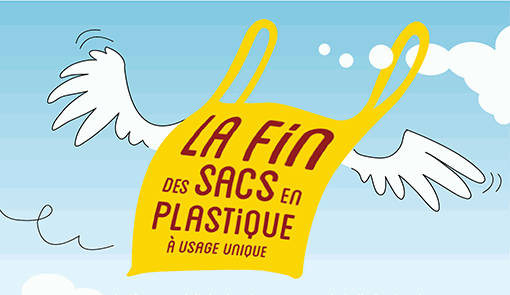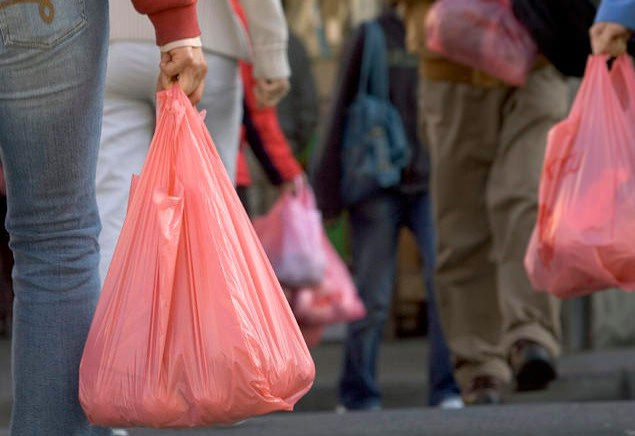http://e-info.org.tw/node/114981
塑膠袋禁令7月上路 法部長:有助帶動綠色經濟
文字大小
485 1 Share1

本報2016年4月29日綜合外電報導,周念學編譯;蔡麗伶審校
法國環境部長頒布法令,7月1日起商家全面禁用厚度小於0.05毫米的一次性塑膠袋,熟食用的塑膠袋也從2017年1月1日起禁用。不過為了刺激生物可分解塑膠產業發展,這項規定不限於再生材料達一定比例的塑膠袋。環境部長賀雅爾(Ségolène Royal)表示,如此將有助於生物技術產業發展,並增加6000個工作機會。
直至今日,法國已生產26億個一次性塑膠袋。消費掉的170億件塑膠袋中,其中約有90%從亞洲進口。
法國政府這次禁用的一次性塑膠袋,定義為厚度小於0.05毫米的袋型。這項法令是能源轉型法(Energy Transition for Green Growth Bill)的規範之一,該法案同時也對超商銷毀剩食的現象做出初步規範。
法令雖從原本預定施行的今年1月初延宕至7月,不過也因此預留給消費者及供應者一段緩衝期,能使用完手邊的塑膠袋。此外,為促進生物可分解產業發展,2017年1月1日起,再生材料比例達30%的一次性塑膠袋將不在禁用範圍內;標準逐年提高,2020年再生材料需達50%才准許使用,2025年再提高為60%。
法國生態部(Ministry of Ecology)表示,立法焦點在於將生物不可分解塑膠袋從市場上淘汰後,所產生的環境利益。因為這些塑膠袋的使用期間短暫,卻要花上好幾百年的時間才能分解,還有可能被海洋動物與鳥類吃下肚。
海洋廢棄物有75%是塑膠,海龜也容易將塑膠誤認為水母而吃下肚。法國生態部特別提出這點說明破壞性的環境衝擊。賀雅爾表示,有86%的海龜因此而受害。此外,北海有94%海鳥的腹中發現塑膠,整體而言,至少有260種生物都因塑膠袋泛濫的問題而遭波及。

法國禁用一次性塑膠袋。圖片來源:法國生態永續發展暨能源部 Ministry of Ecology, Sustainable Development and Energy。
不過法令許可的生物可分解塑膠,在約26°C左右就會逐漸分解,因此符合新法令的塑膠袋,將無法撐過亞洲到法國的這段路程,也形同加重法國製造商的生產者責任,以提供更合適的運送袋。
生技產業展新機 創造6000工作機會
法國生技協會(Club Bio-plastiques)表示,塑膠禁令有助該國綠色經濟發展潛力,促進生技的創新研發,提供持續性解決方案,以因應塑膠袋長期對環境造成的衝擊。
該協會表示,這項法令意味著相關部門可以因應未來的需求,投資生產工具,前景相當看好。這項外界期待已久的法令實施後,也將確保以植物為主的生物可分解塑膠產業可永續發展、創造數千個工作機會,確保法國在這方面的領頭羊地位。
法國政府估計,生物可分解塑膠這項新興發展,可在國內製造6000個新工作機會,例如研發單位、生產作物以作為原料基礎、以植物為素材製作新的樹脂,製成生物可分解的產品等等。
FRENCH CARRIER BAG BAN TO BOOST BIO-BASED PRODUCTS
By Edward Perchard | 5 April 2016 | Add a Comment
The French Ministry of Ecology last week (30 March) published a decree on the complete banning of single-use plastic bags from tills from 1 July this year, with similar plastic bags for fruit, vegetables, fish and delicatessen goods to be banned from 1 January 2017.
Single-use plastic bags are defined as those thinner than 50 microns (0.05 millimetres). Only compostable bags containing an increasing proportion of renewable raw materials will be excluded from the ban. From 1 January 2017, bags containing 30 per cent renewable raw materials will be allowed. This will increase to 50 per cent in 2020 and 60 per cent in 2025.
The ban was included in the Energy Transition for Green growth bill, which also initially carried laws against supermarkets destroying of food waste, and was originally scheduled to come into practice on at the beginning of this year. The ban was delayed until July, however, to give shopkeepers and suppliers a chance to use up their stock of plastic bags.
In a statement following the decree, the Ministry of Ecology focused on the environmental benefits of removing non-biodegradable plastic bags from the market, stating that they are used for a few minutes but take several hundred years to degrade and are ingested by marine animals and birds.
The ministry highlighted that 75 per cent of waste dumped at sea is plastic and used the case of sea turtles, which mistake plastic bags for jellyfish as an example of its destructive effect. Royale said that 86 per cent of marine turtles are affected by this phenomenon. In addition, in the North Sea, 94 per cent of the stomachs of birds contain plastic. In all, there are more than 260 species that are impacted by plastic bags.
Opportunity for bio-based industry
The French bioplastics association Club Bio-plastiques has noted the opportunity that the ban presents for the country’s green economy, stating that it will enable the development of an innovation chain and offer a lasting solution to the problem of persistent thin plastics in the environment.
A statement released by the organisation said: ‘This decree opens concrete prospects that enable the sector to invest in production tools to meet future demand. The implementation of this long-awaited law will ensure the sustainability of development of the bioplastics industry and will create several thousand jobs. It will ensure France has a future position as leader of the plant-based biodegradable plastics sector.’
The French government predicts that the development of new bio-based plastic will enable the creation of about 6,000 jobs in the country, including jobs in research and development, growing plants as a basis for raw materials, production of novel resins composed of plant material and plants manufacturing bio-based products.
Today, 2.6 billion disposable bags are produced in France, and about 17 billion single-use bags are consumed. Around 90 per cent on the single-use plastic bags currently used in France are imported from Asia. Biodegradable plastics excluded from the ban will start to decompose at around 26°C, meaning that deliveries of bags meeting the requirements would not survive transport from Asia to France. This is likely to put more of an onus on domestic producers to supply carrier bags.
Christophe Doukhi de Boissoudy, Director of bioplastics producer Novamont France and President of Club Bio-plastiques, said: “I welcome, on behalf of the Club Bio-plastiques, the publication of the implementation decree of the Energy Transition law and the implementation of the measure on disposable shopping bags that have been awaited for a long time. Compostable bags contribute effectively to the optimisation of the separate collection of organic waste, also promoted by the law.”

沒有留言:
張貼留言